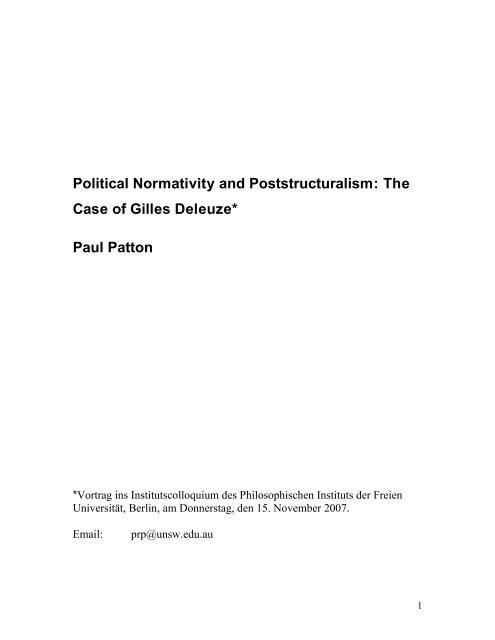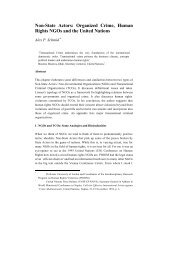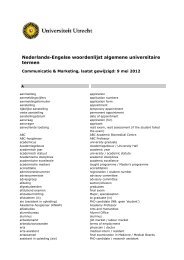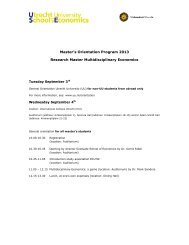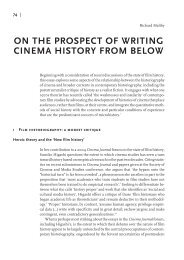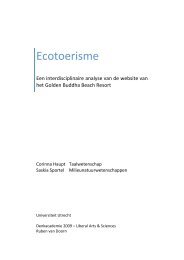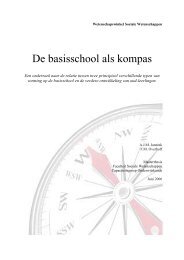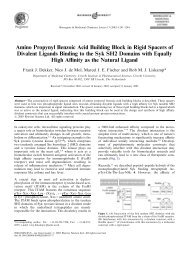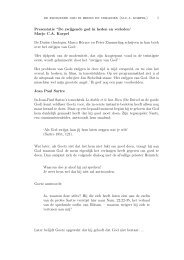Political Normativity and Poststructuralism: The Case of Gilles ...
Political Normativity and Poststructuralism: The Case of Gilles ...
Political Normativity and Poststructuralism: The Case of Gilles ...
You also want an ePaper? Increase the reach of your titles
YUMPU automatically turns print PDFs into web optimized ePapers that Google loves.
<strong>Political</strong> <strong>Normativity</strong> <strong>and</strong> <strong>Poststructuralism</strong>: <strong>The</strong><strong>Case</strong> <strong>of</strong> <strong>Gilles</strong> Deleuze*Paul Patton*Vortrag ins Institutscolloquium des Philosophischen Instituts der FreienUniversität, Berlin, am Donnerstag, den 15. November 2007.Email:prp@unsw.edu.au1
plays no independent role in this theory. In this sense, their treatment <strong>of</strong> thepolitical resembles that <strong>of</strong> Marx, except that it is undertaken from theperspective <strong>of</strong> desire rather than the social organization <strong>of</strong> production: ‘<strong>The</strong>truth <strong>of</strong> the matter is that social production is purely <strong>and</strong> simply desiringproduction itself under determinate conditions … <strong>The</strong>re is only desire <strong>and</strong>the social, <strong>and</strong> nothing else’ (Deleuze <strong>and</strong> Guattari 1977: 29). What they callthe Territorial, Despotic <strong>and</strong> Civilised social machines are treated only asdifferent regimes <strong>of</strong> co-ordination <strong>and</strong> control <strong>of</strong> the local machines thatconstitute individual, familial <strong>and</strong> social life. <strong>The</strong>re is no discussion <strong>of</strong> thenorms that regulate modern political life, only the normativity inherent in thetypology <strong>of</strong> desiring machines as embodying either the paranoiac,reactionary <strong>and</strong> fascistic pole <strong>of</strong> desire or the schizoid revolutionary pole(Deleuze <strong>and</strong> Guattari 1977: 366). For this reason, schizoanalysis as a theory<strong>and</strong> a practice <strong>of</strong> desire proposes neither a political program nor a project fora future form <strong>of</strong> society. At most, it <strong>of</strong>fers a conceptual apparatus withinwhich to pose questions about social investments <strong>of</strong> desire, the ways inwhich it can become complicit in its own repression <strong>and</strong> the ways in which itmight sustain creative or revolutionary social processes.A Thous<strong>and</strong> Plateaus is no more concerned than Anti-Oedipus withthe nature, justification or critique <strong>of</strong> specifically political institutions <strong>and</strong>practices. It broadens <strong>and</strong> generalizes Deleuze <strong>and</strong> Guattari’s social ontologyso that it becomes a general theory <strong>of</strong> assemblages <strong>and</strong> the manner in whichthese are expressed throughout human history. <strong>The</strong> successive plateausprovide a series <strong>of</strong> new concepts <strong>and</strong> associated terminology with which todescribe different kinds <strong>of</strong> social, political, linguistic <strong>and</strong> affectiveassemblages. <strong>The</strong>se include the terminology employed to outline a micro asopposed to macro politics (body without organs as opposed to organization,molecular as opposed to molar, minoritarian as opposed to majoritarian,lines <strong>of</strong> flight or deterritorialization etc.); the terminology employed todescribe forms <strong>of</strong> State as apparatuses <strong>of</strong> capture <strong>and</strong> Capitalism as a nonterritoriallybased axiomatic <strong>of</strong> flows (<strong>of</strong> materials, labour <strong>and</strong> information)as opposed to a territorial system <strong>of</strong> overcoding; <strong>and</strong> the terminologyemployed to describe the abstract machines <strong>of</strong> metamorphosis (nomadicwar-machines) that are the agents <strong>of</strong> social <strong>and</strong> political transformation.This machinic ontology is normative in a specific <strong>and</strong> formal sense,namely that the different kinds <strong>of</strong> assemblage amount to a world that accordssystematic priority to certain kinds <strong>of</strong> movement: to becoming-minor as aprocess <strong>of</strong> deviation from a majoritarian st<strong>and</strong>ard, to lines <strong>of</strong> flight ordeterritorialization, to nomadic machines <strong>of</strong> metamorphosis rather thanapparatuses <strong>of</strong> capture, to smooth rather than striated space, <strong>and</strong> so on. In3
this sense, their ontology <strong>of</strong> assemblages is also an ethics or an ethology.This ethics might be characterised in the language <strong>of</strong> one or other <strong>of</strong> theplateaus as an ethics <strong>of</strong> becoming, <strong>of</strong> flows or lines <strong>of</strong> flight or, I argued inDeleuze <strong>and</strong> the <strong>Political</strong>, as an ethics <strong>and</strong> a politics <strong>of</strong> deterritorialization(Patton 2000, 9, 136). It is ‘political’ only in the very broad sense that itenables us to conceptualise <strong>and</strong> describe transformative forces <strong>and</strong>movements as well as the forms <strong>of</strong> ‘capture’ or blockage to which these aresubject. Consider how this works in the language <strong>of</strong> de/reterritorialization:At the end <strong>of</strong> A Thous<strong>and</strong> Plateaus, deterritorialization is defined as themovement or process by which something escapes or departs from a giventerritory (Deleuze <strong>and</strong> Guattari 1987, 508), where a territory can be a system<strong>of</strong> any kind: conceptual, linguistic, social or affective. By contrast,reterritorialization refers to the ways in which deterritorialized elementsrecombine <strong>and</strong> enter into new relations in the constitution <strong>of</strong> a newassemblage or the modification <strong>of</strong> the old. On their account, systems <strong>of</strong> anykind always include ‘vectors <strong>of</strong> deterritorialization,’ whiledeterritorialization is always ‘inseparable from correlativereterritorializations’ (Deleuze <strong>and</strong> Guattari 1987: 509). Deterritorializationcan take either a negative or a positive form: it is negative when thedeterritorialized element is subjected to reterritorialization that obstructs orlimits its line <strong>of</strong> flight. It is positive when the line <strong>of</strong> flight prevails over theforms <strong>of</strong> reterritorialization <strong>and</strong> manages to connect with otherdeterritorialized elements in a manner that extends its trajectory or evenleads to reterritorialization in an entirely new assemblage. In this sense, theysay, the effective transformation <strong>of</strong> a given field <strong>of</strong> reality requires theconnection <strong>of</strong> deterritorialized elements in mutually supportive <strong>and</strong>productive ways rather than their conjugation within a new system <strong>of</strong>capture (Deleuze <strong>and</strong> Guattari 1987: 220, .As well as distinguishing negative <strong>and</strong> positive deterritorialization,connection <strong>and</strong> conjugation, Deleuze <strong>and</strong> Guattari further distinguishbetween absolute <strong>and</strong> relative deterritorialization. This corresponds to theontological distinction they draw between a virtual <strong>and</strong> an actual order <strong>of</strong>things: absolute deterritorialization takes place in the virtual realm whilerelative deterritorialization concerns only movements within the actual. Inthe terms <strong>of</strong> their ontology <strong>of</strong> assemblages, it is the virtual order <strong>of</strong>becoming that governs the fate <strong>of</strong> any actual assemblage. Absolutedeterritorialization is the underlying condition <strong>of</strong> all forms <strong>of</strong> relativedeterritorialization. It is the immanent source <strong>of</strong> transformation or the‘reserve’ <strong>of</strong> freedom or movement in reality that is activated wheneverrelative deterritorialization occurs. As such, it is closer to a Bergsonian4
concept <strong>of</strong> freedom in the world rather than a Kantian concept <strong>of</strong> freedom <strong>of</strong>the will. Absolute deterritorialization expresses the normative ideal at theheart <strong>of</strong> Deleuze <strong>and</strong> Guattari’s ethics. It is the concept <strong>of</strong> an abstract, nonorganic<strong>and</strong> creative life which is expressed in the positive or negativedeterritorialization <strong>of</strong> existing assemblages <strong>and</strong> their reconfiguration intonew assemblages. <strong>The</strong> sense in which it amounts to an ethical principleembedded within a conception <strong>of</strong> the world becomes clear when theydescribe it as ‘the deeper movement ... identical to the earth itself’ (Deleuze<strong>and</strong> Guattari 1987: 143).<strong>The</strong> normativity <strong>of</strong> Deleuze <strong>and</strong> Guattari’s concepts provides aframework within which to evaluate the character <strong>of</strong> particular events <strong>and</strong>processes. <strong>The</strong>y enable us to pose questions such as: is this negative orpositive reterritorialization? Is this a genuine line <strong>of</strong> flight? Will it lead to arevolutionary new assemblage in which there is an increase <strong>of</strong> freedom orwill it lead to a new form <strong>of</strong> capture or worse? (Deleuze <strong>and</strong> Parnet 1987:143-144). However, there are two important features <strong>of</strong> this normativitywhich distinguish it from the kind <strong>of</strong> normativity more commonly found inpolitical philosophy. First, it only provides criteria <strong>of</strong> evaluation that areambivalent <strong>and</strong> contextual. Consider the lines <strong>of</strong> flight along whichindividual or collective assemblages break down or become transformed. Onthe one h<strong>and</strong>, in so far as we are interested in bringing about change wecannot avoid experimentation with such lines because ‘it is always on a line<strong>of</strong> flight that we create’ (Deleuze <strong>and</strong> Parnet 1987: 135). In this sense, lines<strong>of</strong> flight are potential pathways <strong>of</strong> mutation in an individual or social fabric<strong>and</strong> sources <strong>of</strong> the affect associated with the passage from a lower to ahigher state <strong>of</strong> power, namely joy. On the other h<strong>and</strong>, lines <strong>of</strong> flight havetheir own dangers. Once having broken out <strong>of</strong> the limits imposed by themolar forms <strong>of</strong> segmentarity <strong>and</strong> subjectivity, a line <strong>of</strong> flight may fail toconnect with the necessary conditions <strong>of</strong> creative development or beincapable <strong>of</strong> so connecting <strong>and</strong> turn instead into a line <strong>of</strong> destruction, death<strong>and</strong> despair (Deleuze <strong>and</strong> Guattari 1987: 229). In the same manner, none <strong>of</strong>the deterritorialising processes described in A Thous<strong>and</strong> Plateaus providesgrounds for unambiguous practical political orientation. In the evaluativeschema outlined, nothing is good or bad in itself : ‘it all depends on a carefulsystematic use … we’re trying to say you can never guarantee a goodoutcome (its not enough just to have a smooth space, for example, toovercome striations <strong>and</strong> coercion, or a body without organs to overcomeorganizations)’ (Deleuze 1995: 32).Second, while Deleuze <strong>and</strong> Guattari’s political orientation was broadlyMarxist in the sense that it was anti-capitalist <strong>and</strong> envisaged the emergence5
<strong>of</strong> new <strong>and</strong> better forms <strong>of</strong> social <strong>and</strong> political life, they did not engagedirectly with the political norms embedded in existing political institutions<strong>and</strong> ways <strong>of</strong> life. In the course <strong>of</strong> outlining the inherently political vocation<strong>of</strong> philosophy, they suggest that philosophical concepts are critical <strong>of</strong> thepresent to the extent that they ‘connect up with what is real here <strong>and</strong> now inthe struggle against capitalism’ (Deleuze <strong>and</strong> Guattari 1994: 100). However,they do not directly address the normative principles that inform their criticalperspective on the present, much less the question how these might bearticulated with those principles that are supposed to govern political life inlate capitalist societies. So, for example, while they insist on the importance<strong>of</strong> political struggles in relation to welfare <strong>and</strong> unemployment benefits, they<strong>of</strong>fer no normative theory in support <strong>of</strong> the redistribution <strong>of</strong> wealth or anyprinciples <strong>of</strong> a just distribution. While they point to the importance <strong>of</strong>struggles for regional <strong>and</strong> national autonomy, they <strong>of</strong>fer no normativegrounds for the establishment <strong>of</strong> differential rights for cultural or nationalminorities (Deleuze <strong>and</strong> Guattari 1987: 471). In this sense, their politicalphilosophy does not engage with the political values <strong>and</strong> normative conceptswhich are supposed to inform the basic institutions <strong>of</strong> modern liberaldemocracies, such as the equal moral worth <strong>of</strong> individuals, freedom <strong>of</strong>conscience, the rule <strong>of</strong> law, fairness in the distribution <strong>of</strong> material goodsproduced by social cooperation <strong>and</strong> so on. <strong>The</strong> principled differencesbetween liberal democratic, totalitarian <strong>and</strong> fascist States are mentioned onlyin passing in the course <strong>of</strong> their analysis <strong>of</strong> capitalism <strong>and</strong> present daypolitics as a process <strong>of</strong> axiomatisation <strong>of</strong> the social <strong>and</strong> economic field(Deleuze <strong>and</strong> Guattari 1987: 454 – 466 ; 1994 : 106). As a consequence,their machinic social ontology remains formal in relation to actual societies<strong>and</strong> forms <strong>of</strong> political organisation.Deleuze’s turn towards <strong>Political</strong> <strong>Normativity</strong>Read in the context <strong>of</strong> Western Marxism during the 1960s <strong>and</strong> 1970s,Deleuze <strong>and</strong> Guattari’s failure to engage directly with the political values<strong>and</strong> normative concepts that are supposed to inform the basic institutions <strong>of</strong>modern liberal democracies is not surprising. <strong>The</strong>ir political philosophy predateswidespread underst<strong>and</strong>ing <strong>and</strong> acceptance <strong>of</strong> the ways in which Marx’scritique <strong>of</strong> capitalist society is bound up with concepts <strong>of</strong> distributive justice,as it does the efforts to identify the relevant principles <strong>of</strong> justice thatoccurred under the impact <strong>of</strong> so-called analytic Marxism in the course <strong>of</strong> the1980s. Since then, the English speaking world has seen numerous attemptsto combine Marxist social theory with the normative principles informing6
varieties <strong>of</strong> left-liberal political theory. 2 While these developments had littleimpact elsewhere, there was a similar rediscovery <strong>of</strong> ethical <strong>and</strong> politicalnormativity in France during this period, expressed in a renewed interest inhuman rights, subjectivity, justice, equality <strong>and</strong> freedom. We can seeevidence <strong>of</strong> this, for example, in the shift in Derrida’s concerns that led himto engage directly with concepts <strong>of</strong> democracy, law <strong>and</strong> justice during thecourse <strong>of</strong> the 1980s (Patton 2007b).In the case <strong>of</strong> Deleuze, his comments in interviews <strong>and</strong> otheroccasional writing during the 1980s <strong>and</strong> then What is Philosophy? amount toa significant step towards positive engagement with the institutions <strong>and</strong>implicit political values <strong>of</strong> modern liberal democracy. Two issues inparticular signal this turn towards political normativity in his later writings:first, his comments about rights <strong>and</strong> jurisprudence, <strong>and</strong> second, in thecontext <strong>of</strong> his definition <strong>of</strong> philosophy, his remarks about democracy <strong>and</strong>‘becoming-democratic.’ Given that the term ‘becoming-democratic’ occursonly once in What is Philosophy? it would be an exaggeration to include itamong the list <strong>of</strong> concepts created by Deleuze <strong>and</strong> Guattari. Nevertheless, Iwill try to show that some <strong>of</strong> the elements <strong>of</strong> their earlier ‘politicalphilosophy’ provide the resources needed to develop such a concept.(1) In a series <strong>of</strong> interviews during the 1980s, Deleuze responds to therenewed interest in human rights during this period by criticising the mannerin which these are represented as ‘eternal values’ <strong>and</strong> ‘new forms <strong>of</strong>transcendence.’ 3 At the same time, he makes it clear that he is not opposedto rights as such but only to the idea that there is a definitive <strong>and</strong> a-historicallist <strong>of</strong> supposed universal rights. He argues that rights are not the creation <strong>of</strong>codes or declarations but <strong>of</strong> jurisprudence, where this implies working withthe ‘singularities’ <strong>of</strong> a particular situation (Deleuze 1995: 153). He returns tothe question <strong>of</strong> rights <strong>and</strong> jurisprudence in his Abécédaire interviews withClaire Parnet recorded in 1988, where he affirms the importance <strong>of</strong>jurisprudence understood as the invention <strong>of</strong> new rights, along with his ownfascination for the law. 4 In his 1990 interview with Negri, ‘Control <strong>and</strong>Becoming,’ he reaffirms the importance <strong>of</strong> jurisprudence as a source <strong>of</strong> lawwith reference to the question what rights should be established in relation tonew forms <strong>of</strong> biotechnology (Deleuze 1995: 169). <strong>The</strong> very concept <strong>of</strong> rightsimplies a rule <strong>of</strong> law. It implies that certain kinds <strong>of</strong> action on the part <strong>of</strong> allcitizens will be protected by law <strong>and</strong>, conversely, the enforcement <strong>of</strong> limitsto the degree to which citizens can interfere with the actions <strong>of</strong> others. 5(2) Already in 1979 Deleuze’s ‘Open Letter to Negri’s Judges’adopted the speaking position <strong>of</strong> one ‘committed to democracy’ (Deleuze2006: 169). This theme becomes more pronounced in What is Philosophy?7
thinking, acting <strong>and</strong> speaking in order to find points <strong>of</strong> difference or exitfrom the past (Foucault 1997: 315). Deleuze appears to go further thanFoucault in suggesting that there is a utopian dimension to philosophy as heunderst<strong>and</strong>s it. Etymologically, he writes, utopia means ‘absolutedeterritorialization but always at the critical point at which it is connectedwith the present relative milieu’ (Deleuze <strong>and</strong> Guattari 1994: 100). In otherwords, when there is a connection between the absolute deterritorializationexpressed in concepts <strong>and</strong> forms <strong>of</strong> relative deterritorialization already atwork in the social field, philosophy becomes utopian <strong>and</strong> achieves itspolitical vocation, taking the criticism <strong>of</strong> its own time ‘to its highest point’(Deleuze <strong>and</strong> Guattari 1994: 99). Deleuzian philosophy is utopian, not in thesense that it posits an ideal society or sets out principles <strong>of</strong> justice in the light<strong>of</strong> which we might identify the shortcomings <strong>of</strong> existing societies, but in thesense that it creates concepts that can link up with processes <strong>of</strong>deterritorialization present in a given historical milieu, informing theperceptions <strong>and</strong> therefore the actions <strong>of</strong> those involved. This is an immanentutopianism that can be compared in some respects to Rawls’s ‘realisticutopianism’ (see below). 8Becoming-democraticThis brief account <strong>of</strong> Deleuze’s immanent utopianism helps us to see howthe concept <strong>of</strong> ‘becoming-democratic’ might serve the political function <strong>of</strong>philosophy as he defines it. Different forms <strong>of</strong> democratic political societyamount to determinate actualizations <strong>of</strong> the concept or ‘pure event’ <strong>of</strong>democracy. If we suppose that existing processes <strong>of</strong> deterritorialization or‘lines <strong>of</strong> flight’ in modern societies include the ideals or opinions thatmotivate or inform particular forms <strong>of</strong> resistance, it follows that this kind <strong>of</strong>immanent utopianism will draw upon elements <strong>of</strong> existing politicalnormativity to suggest ways in which the injustice or intolerability <strong>of</strong> presentinstitutional forms <strong>of</strong> social life might be removed. ‘Becoming-democratic’therefore points to ways <strong>of</strong> criticising the workings <strong>of</strong> actually existingdemocracies in the name <strong>of</strong> the egalitarian principles that are supposed toinform their institutions <strong>and</strong> political practices. In Deleuzean terms, thephilosophical concept <strong>of</strong> democracy is a means to counter-actualize whatpasses for democratic society in the present, while becoming-democraticallows us to counter-actualize movements or processes <strong>of</strong> democratization.Philosophy pursues or supports such processes <strong>of</strong> becoming-democratic, forexample, when it challenges existing opinions about what is acceptable,9
ight or just with the aim <strong>of</strong> extending the actualization <strong>of</strong> democracy withincontemporary societies.<strong>The</strong> complex concept <strong>of</strong> democracy ties together a number <strong>of</strong> thepolitical norms at the heart <strong>of</strong> modern political thought. In principle, therewill be as many ways <strong>of</strong> becoming-democratic as there are elements <strong>of</strong> theconcept <strong>of</strong> democracy. In practice, philosophy can only effectively advancethe becoming-democratic <strong>of</strong> a given political society when it engages withdeterritorializing movements that rely upon actualized or actualizableelements <strong>of</strong> democratic political normativity. Deleuze <strong>of</strong>fers no detailedaccount <strong>of</strong> just what he underst<strong>and</strong>s by ‘becoming-democratic’ <strong>and</strong> it is notdifficult to imagine forms <strong>of</strong> populism that go against the grain <strong>of</strong> hispolitical sensibility. Like all forms <strong>of</strong> deterritorialization, this one is notwithout its dangers. <strong>The</strong> comments on Heidegger in What is Philosophy?remind us that it is not enough to put one’s faith in the people: it depends onwhat people <strong>and</strong> how they are constituted as a political community (Deleuze<strong>and</strong> Guattari 1994: 108-109). At the same time, it is not difficult to findelements in his work with Guattari that enable us to fill out the concept <strong>of</strong>becoming-democratic. For example:(1) One <strong>of</strong> the sources <strong>of</strong> conflict that has been present ever since theintroduction <strong>of</strong> modern democratic government has been the coexistence <strong>of</strong>formally equal rights alongside enormous disparities <strong>of</strong> material condition.<strong>The</strong> history <strong>of</strong> modern democracies has been in part a history <strong>of</strong> struggle toreduce material inequality <strong>and</strong> to ensure that the basic rights <strong>of</strong> citizens haveat least approximately equal value for all. Deleuze alludes to this ongoingproblem when he contrasts the universality <strong>of</strong> the market with the manner inwhich it unequally distributes poverty as well as enormous wealth. He iscritical <strong>of</strong> the way in which modern democratic states fail to live up to theiregalitarian promise: ‘<strong>The</strong>re is no democratic state that is not compromised tothe very core by its part in generating human misery’ (Deleuze 1995: 173). 9Given that the benefits <strong>of</strong> market economies are not universally shared <strong>and</strong>inequalities <strong>of</strong> condition are h<strong>and</strong>ed down from generation to generation indirect contravention <strong>of</strong> the principle that all are born equal, then we can saythat achieving a more just distribution <strong>of</strong> material social goods is one vector<strong>of</strong> ‘becoming-democratic.’(2) Another constant source <strong>of</strong> conflict in democratic nation statesever since their inception has been the struggle to broaden the base <strong>of</strong> thosewho count as citizens <strong>and</strong> thus enjoy full access to the entire range <strong>of</strong> basiclegal <strong>and</strong> political rights. Democracy has always relied upon the principle <strong>of</strong>majority rule, but the prior question ‘majority <strong>of</strong> whom’ has always beensettled in advance <strong>and</strong> usually not by democratic means. This exposes a fault10
in one <strong>of</strong> the key components <strong>of</strong> the concept <strong>of</strong> democracy, namely theconcept <strong>of</strong> majority. This can mean either the quantitative majority <strong>of</strong> thosecounted or the qualitative majority <strong>of</strong> those among the population at largewho are considered fit to be counted. Deleuze <strong>and</strong> Guattari rely upon thelatter, qualitative sense <strong>of</strong> majority in A Thous<strong>and</strong> Plateaus when they pointto the existence <strong>of</strong> a majoritarian ‘fact’ in contemporary European derivedsocieties, namely the priority <strong>of</strong> ‘the average adult-white-heterosexual-European-male-speaking a st<strong>and</strong>ard language’ (Deleuze <strong>and</strong> Guattari 1987:105). <strong>The</strong> adult, white et cetera male is majoritarian not because he isnumerically in the majority but because he forms the st<strong>and</strong>ard against whichthe rights <strong>and</strong> duties <strong>of</strong> all citizens are measured. <strong>The</strong>y define minoritarianbecomings as the variety <strong>of</strong> ways in which individuals <strong>and</strong> groups fail toconform to this st<strong>and</strong>ard.<strong>The</strong> social movements corresponding to these becomings have givenrise to a succession <strong>of</strong> measures to extend the scope <strong>of</strong> the st<strong>and</strong>ard <strong>and</strong>thereby broaden the subject <strong>of</strong> democracy: first, by extending the vote towomen <strong>and</strong> other minorities; second, by changing the nature <strong>of</strong> politicalinstitutions <strong>and</strong> procedures to enable these newly enfranchised members toparticipate on equal terms. Efforts to change the nature <strong>of</strong> public institutionsin ways that both acknowledge <strong>and</strong> accommodate many kinds <strong>of</strong> differenceare ongoing in democratic societies, for example in relation to sexualdifference, sexual preference, different physical <strong>and</strong> mental abilities, cultural<strong>and</strong> religious affiliations. Deleuze <strong>and</strong> Guattari affirm the importance <strong>of</strong>efforts to enlarge the character <strong>of</strong> the majority, even as they insist that thepower <strong>of</strong> minorities ‘is not measured by their capacity to enter into <strong>and</strong> makethemselves felt within the majority system’ (Deleuze <strong>and</strong> Guattari 1987:471). By their nature, processes <strong>of</strong> minoritarian-becoming will alwaysexceed or escape from the confines <strong>of</strong> any given majority. <strong>The</strong>y carry thepotential to transform the affects, beliefs <strong>and</strong> political sensibilities <strong>of</strong> apopulation in ways that amount to the advent <strong>of</strong> a new people. In turn, to theextent that a people is constituted as a political community, thetransformations it undergoes will affect its conceptions <strong>of</strong> what is fair <strong>and</strong>just <strong>and</strong> therefore the nature <strong>of</strong> the rights <strong>and</strong> duties attributed to the newmajority. 10 Minoritarian becomings therefore provide another vector <strong>of</strong>‘becoming-democratic.’(3) A third struggle concerns the principle <strong>of</strong> legitimacy that governsdecisions in a democratic polity. In his ‘Control <strong>and</strong> Becoming’ interviewwith Negri, Deleuze comments on the importance <strong>of</strong> jurisprudence as asource <strong>of</strong> law <strong>and</strong> new rights with reference to the question <strong>of</strong> rights inrelation to new forms <strong>of</strong> biotechnology. He goes on to add that we mustn’t11
leave decisions on such matters to judges or experts. What is required is notmore committees <strong>of</strong> supposedly well qualified wise men to determine rightsbut rather ‘user groups’ (Deleuze 1995: 169-170). <strong>The</strong> implicit principle inthis recommendation is the democratic idea that decisions ought to be takenin consultation with those most affected by them. This is one <strong>of</strong> the foundingprinciples <strong>of</strong> modern democratic governance <strong>and</strong> many theorists recommendits extension <strong>and</strong> application to new contexts such as the workplace (Peffer1990: 419-420). Ian Shapiro argues that whether or not someone is entitledto a say in a particular decision depends upon whether or not their interestsare likely to be affected by the outcome <strong>and</strong> upon the nature <strong>of</strong> thoseinterests: the more fundamental the interest the greater their entitlement to avoice in the decision-making process (Shapiro 2003: 52). Deleuze’sproposed application <strong>of</strong> the principle in the realm <strong>of</strong> biotechnologies givesreason to think that the opening-up <strong>of</strong> decision making proceduresthroughout society constitutes a further vector <strong>of</strong> ‘becoming-democratic.’Immanent criticism <strong>and</strong> considered opinionDeleuze’s appeal to the concept <strong>of</strong> ‘becoming-democratic’ as the means toresist the injustices <strong>of</strong> capitalism provides grounds for comparing certainfeatures <strong>of</strong> his later political philosophy <strong>and</strong> Rawls’s political liberalism(Patton 2007a). For example, both subscribe to a form <strong>of</strong> utopianism basedupon normative concepts immanent to the political culture <strong>of</strong> the society inquestion. Rawls suggests that one <strong>of</strong> the functions served by a politicalconception <strong>of</strong> justice is to enable the criticism <strong>of</strong> existing institutions.Moreover, just as ‘becoming-democratic’ implicitly draws upon elements <strong>of</strong>our existing concept <strong>of</strong> democracy as well as ongoing struggles toimplement or exp<strong>and</strong> democratic principles <strong>of</strong> government, so politicalliberalism elaborates a theory <strong>of</strong> justice on the basis <strong>of</strong> concepts <strong>and</strong>convictions already present in the public culture <strong>of</strong> liberal democracies.Democratic political order requires principles <strong>of</strong> public reason to set limits tothe conduct <strong>of</strong> public debate <strong>and</strong> provide the normative framework withinwhich disagreements can be settled, or at least kept within reasonablebounds so as not to threaten stability. Rawls’s answer to the question ‘wheredo these principles come from?’ is to say that their ultimate foundation liesin the settled convictions <strong>and</strong> considered opinions <strong>of</strong> the people concerned.<strong>The</strong> principles <strong>of</strong> public reason <strong>and</strong> the political conception <strong>of</strong> justice onwhich they are based must be consistent with the settled convictions <strong>of</strong> thepolitical culture, such as the toleration <strong>of</strong> religious diversity or theabhorrence <strong>of</strong> slavery. <strong>The</strong> ultimate test <strong>of</strong> an acceptable political conception12
<strong>of</strong> justice is the achievement <strong>of</strong> ‘reflective equilibrium’ between theproposed principles <strong>of</strong> justice <strong>and</strong> the firmly held convictions embedded inthe institutions <strong>and</strong> traditions <strong>of</strong> the political culture (Rawls 2001: 31). <strong>The</strong>sense in which the overlapping consensus which underpins politicalliberalism’s principles <strong>of</strong> justice appeals to nothing outside the convictions<strong>and</strong> discourses which form part <strong>of</strong> a particular political assemblage justifiesthe claim that Rawls, like Deleuze, <strong>of</strong>fers an immanent political utopianism.Second, Deleuze <strong>and</strong> Rawls both define the task <strong>of</strong> politicalphilosophy in relation to a certain kind <strong>of</strong> opinion that must be distinguishedfrom the day-to-day opinions <strong>of</strong> citizens. <strong>The</strong> role <strong>of</strong> reflective equilibriumin Rawls’s theory quite explicitly ties the political conception <strong>of</strong> justice tothe considered opinions <strong>of</strong> people on fundamental principles <strong>of</strong> right,fairness <strong>and</strong> justice ins<strong>of</strong>ar as these are expressed in the institutions, theconstitutional settlements, legal decisions <strong>and</strong> traditions <strong>of</strong> interpretation <strong>of</strong>the society in question. <strong>Political</strong> liberalism therefore implies a distinctionbetween considered opinions about right ways <strong>of</strong> acting <strong>and</strong> everydayopinions on matters <strong>of</strong> current concern or public policy. A similar distinctionappears in What is Philosophy? when Deleuze points out that there is nouniversal democratic state but only particular democratic states, the contours<strong>of</strong> which are determined in part by philosophical or ‘nationalitarian’opinions about what is right, fair <strong>and</strong> just. He suggests that, to the extent thatmodern philosophy is reterritorialized on the idea <strong>of</strong> the democratic state <strong>and</strong>human rights, this will always be constrained by features <strong>of</strong> the‘nationalitarian’ philosophy concerned:In each case philosophy finds a way <strong>of</strong> reterritorializing itself inthe modern world in conformity with the spirit <strong>of</strong> a people <strong>and</strong> itsconception <strong>of</strong> right. <strong>The</strong> history <strong>of</strong> philosophy therefore is markedby national characteristics or rather by nationalitarianisms whichare like philosophical opinions (Deleuze <strong>and</strong> Guattari 1994: 104emphasis added).As with Rawls, we can suppose that these philosophical opinions areexpressed in the political <strong>and</strong> legal institutions <strong>of</strong> a given people, theirconceptions <strong>of</strong> right, justice <strong>and</strong> equality. As such, they determine thenational characteristics <strong>of</strong> the thought <strong>of</strong> a people. <strong>The</strong>y will also conditionthe institutional <strong>and</strong> constitutional structure <strong>of</strong> particular national forms <strong>of</strong>democracy. In this manner, for example, opinions about the naturalhierarchies <strong>of</strong> race, sex <strong>and</strong> class have long influenced the procedures <strong>and</strong>distribution <strong>of</strong> basic political <strong>and</strong> civil rights in otherwise democratic13
societies. <strong>The</strong> limits that flow from the manner in which democratic idealsare expressed in accordance with the philosophical opinions <strong>of</strong> particularpeoples amount to one kind <strong>of</strong> constraint on the institutional <strong>and</strong> legalactualisation <strong>of</strong> democratic ideals in a given society.Deleuze points to a second kind <strong>of</strong> constraint on the implementation <strong>of</strong>democratic ideals that follows from the requirements <strong>of</strong> global capitalism.To the extent that modern democratic states function as ‘models <strong>of</strong>realisation’ <strong>of</strong> the immanent axiomatic <strong>of</strong> global capitalism, they will beconstrained by their subordination to the requirements <strong>of</strong> this system. Thisimplies that relations <strong>of</strong> interdependence compromise even the mostdemocratic nodes <strong>of</strong> this global economic system ins<strong>of</strong>ar as they are director indirect beneficiaries <strong>of</strong> the actions <strong>of</strong> dictatorial states. It also impliesthat the extension <strong>of</strong> the fundamental equality <strong>and</strong> security <strong>of</strong> citizens in theform <strong>of</strong> human rights amounts to adding axioms that coexist in the globalaxiomatic <strong>of</strong> capital alongside other axioms, ‘notably those concerning thesecurity <strong>of</strong> property’ (Deleuze <strong>and</strong> Guattari 1994: 107). <strong>The</strong>se property rulesdo not so much contradict the basic rights <strong>of</strong> individuals as suspend theiroperation in certain contexts. Thus, when basic political rights co-existalongside private property in large-scale means <strong>of</strong> production, <strong>and</strong> in theabsence <strong>of</strong> publicly financed elections, they do not have the same value forall citizens. Similarly, when private property in means <strong>of</strong> production existsalongside the absence <strong>of</strong> mechanisms to provide minimal healthcare,housing or education, the basic welfare rights <strong>of</strong> the poor are effectivelysuspended. Considerations such as these lie behind the assertion that ‘Rightscan save neither men nor a philosophy that is reterritorialized on thedemocratic State. Human rights will not make us bless capitalism’ (Deleuze<strong>and</strong> Guattari 1994: 107).<strong>The</strong> first two elements <strong>of</strong> the concept <strong>of</strong> becoming-democraticidentified above directly confront these two kinds <strong>of</strong> limitation on theactualisation <strong>of</strong> democracy in the modern world: the struggle against unjustinequality <strong>of</strong> condition challenges fundamental elements <strong>of</strong> the capitalistaxiomatic, while the struggle against the arbitrary nature <strong>of</strong> the qualitativemajority challenges the weight <strong>of</strong> nationalitarian political <strong>and</strong> philosophicalopinion. <strong>The</strong> different kinds <strong>of</strong> minoritarian-becoming that give rise tomovements to reconfigure the subject <strong>of</strong> democracy, such as the struggle forequal representation <strong>of</strong> women or for equal rights for same-sex partners,encounter varying degrees <strong>and</strong> kinds or resistance depending upon thedetails <strong>of</strong> nationalitarian opinion in each case. <strong>The</strong> third element points to anadditional line <strong>of</strong> flight in contemporary democratic societies that has thepotential to connect up with the first two <strong>and</strong> carry the transformative14
process forward, even to the point <strong>of</strong> breaking down the limits imposed bythe separation <strong>of</strong> a private sphere <strong>of</strong> property relations <strong>and</strong> a public sphere <strong>of</strong>deliberation over the common good. As the ‘contour, the configuration, theconstellation <strong>of</strong> an event to come’ (Deleuze <strong>and</strong> Guattari 1994: 32-33), theconcept <strong>of</strong> becoming-democratic points toward the deterritorialization <strong>of</strong>existing democracies <strong>and</strong> their reconfiguration in new social <strong>and</strong> politicalforms.Describing <strong>and</strong> evaluating these new political territories <strong>and</strong> peoplesrequires that we spell out the normative principles governing their basicinstitutional (macro) structure. Thus, Deleuze’s suggestion that democraticstates are morally <strong>and</strong> politically compromised by their role in theperpetuation <strong>of</strong> this form <strong>of</strong> injustice implicitly raises the normative questionwhat principles <strong>of</strong> distribution should apply in a just democratic society?Should we push for radically egalitarian principles that would treat anyundeserved inequality <strong>of</strong> condition as unjust, or should we be satisfied withsomething like Rawls’s difference principle according to which social <strong>and</strong>economic inequalities are allowed only when they are attached to positionsopen to all <strong>and</strong> when they are ‘to the greatest benefit <strong>of</strong> the least advantagedmembers <strong>of</strong> society’ (Rawls 2005: 6)? Should the principles <strong>of</strong> distributivejustice apply globally or only within the borders <strong>of</strong> particular nation states? Iam not suggesting that Deleuze provides us with the means to answer thesenormative questions, but only that they are inevitably raised by his criticisms<strong>of</strong> the existing state <strong>of</strong> affairs.At the same time, while the further development <strong>of</strong> Deleuzian politicalphilosophy along the paths opened up by the concept <strong>of</strong> ‘becomingdemocratic’implies a need for further engagement with normative politicaltheory, there is also reason to suppose that liberal normative politicalphilosophy might benefit from the formal normativity that pervades Deleuze<strong>and</strong> Guattari’s writings. Rawls <strong>and</strong> Deleuze both distinguish the day to dayopinions <strong>of</strong> citizens from the considered opinions <strong>of</strong> a given people onfundamental principles <strong>of</strong> right. Both agree that political philosophy shouldengage with the opinions <strong>of</strong> the latter kind within a given social milieu.However, there is a significant difference in the nature <strong>of</strong> this engagement ineach case. Rawls’s political liberalism seeks to reconstruct the consideredopinions <strong>of</strong> an historically specific form <strong>of</strong> society in order to produce acoherent concept <strong>of</strong> a fair <strong>and</strong> just society, subject to the qualification thatthis might change as the considered opinions <strong>of</strong> the society change. <strong>Political</strong>liberalism has little to say about how such change comes about. Rawls saysthat it serves the ‘realistically utopian’ task <strong>of</strong> ‘probing the limits <strong>of</strong>practicable political possibility’ by enabling us to ask what a just <strong>and</strong>15
democratic society would be like ‘under reasonably favourable but stillpossible historical conditions’ (Rawls 2001: 4). He recognises that there is aquestion about how we determine the limits <strong>of</strong> the practicably politicallypossible <strong>and</strong> what are in fact the limits <strong>of</strong> our social world. He notes thatthese are not simply given by the actual since we can <strong>and</strong> do change existingsocial <strong>and</strong> political institutions. However, he simply does not pursue thisquestion.By contrast, the ambition to challenge the limits <strong>of</strong> our present socialworld is at the forefront <strong>of</strong> Deleuze’s conception <strong>of</strong> the political vocation <strong>of</strong>philosophy. He pursues a more critical engagement with consideredopinions, aimed at their transformation rather than their systematicreconstruction. An important part <strong>of</strong> the reason why ‘our democracies’ donot provide optimum conditions for the constitution <strong>of</strong> new earths <strong>and</strong> newpeoples stems from the manner in which the consensus <strong>of</strong> opinions in thesesocieties all too <strong>of</strong>ten reflects ‘the cynical perceptions <strong>and</strong> affections <strong>of</strong> thecapitalist’ (Deleuze <strong>and</strong> Guattari 1994: 108, 146). Even the ‘values, ideals<strong>and</strong> opinions <strong>of</strong> our time’ are affected by ‘the meanness <strong>and</strong> vulgarity <strong>of</strong>existence’ that haunts contemporary democracies (Deleuze <strong>and</strong> Guattari1994: 107-8). That is why, in the brief exergue to Negotiations, he presentsphilosophy as engaged in a ‘guerilla campaign’ against public opinion <strong>and</strong>other powers that be such as religions <strong>and</strong> laws (Deleuze 1995). Hiscriticisms <strong>of</strong> the inequalities produced by capitalism should be understood inthis light. <strong>The</strong>y challenge existing opinions about what is acceptable with theaim <strong>of</strong> extending <strong>and</strong> developing equality <strong>of</strong> condition within contemporarysocieties. Success in this kind <strong>of</strong> political philosophy is not measured by thetest <strong>of</strong> reflective equilibrium or by the requirements <strong>of</strong> maintaining a wellorderedsociety but by the capacity <strong>of</strong> its concepts to engage productivelywith real movements <strong>of</strong> social change <strong>and</strong> to assist in opening up paths tonew forms <strong>of</strong> individual <strong>and</strong> collective life. In this sense, thedeterritorializing impulse continues to play a central role in Deleuze’s laterpolitical philosophy. <strong>Political</strong> liberalism might learn from Deleuze (<strong>and</strong>other poststructuralists) to be less cautious <strong>and</strong> more unrealistically utopian.16
Notes12I develop this comparison between Deleuze <strong>and</strong> Rawls in more detail in ‘Utopian<strong>Political</strong> Philosophy: Deleuze <strong>and</strong> Rawls,’ Deleuze Studies, 1:1, 2007, 41-59.For example, Peffer 1990 ; 2001. For an introduction to some <strong>of</strong> the varieties <strong>of</strong>‘analytic’ marxism, see Kymlicka 2002: 166-207. For a comprehensive survey <strong>of</strong> thedebate over Marx <strong>and</strong> justice, see Geras 1985.3 See his conversations with Antonin Dulaure <strong>and</strong> Claire Parnet, published in L’AutreJournal, 8, October 1985, <strong>and</strong> with Raymond Bellour <strong>and</strong> François Ewald, publishedin the Magazine Littéraire, 257, September 1988, in Deleuze 1995: 121- 155. Forcomments on Deleuze’s remarks, see Smith 2003, 314-315 <strong>and</strong> Patton 2005a, 58 - 60<strong>and</strong> 2005b, 404 - 406.45678‘To act for freedom, becoming revolutionary, is to operate in jurisprudence when oneturns to the justice system …that’s what the invention <strong>of</strong> law is … its not a question <strong>of</strong>applying ‘the rights <strong>of</strong> man’ but rather <strong>of</strong> inventing new forms <strong>of</strong> jurisprudence … Ihave always been fascinated by jurisprudence, by law … If I hadn’t studiedphilosophy, I would have studied law, but precisely not « the rights <strong>of</strong> man », ratherI’d have studied jurisprudence.’ (L’abécédaire, G comme gauche).L’Abécédaire de<strong>Gilles</strong> Deleuze avec Claire Parnet is unpublished in literary form but available onvideo cassette (1996) <strong>and</strong> CD Rom (2003) from Vidéo Editions Montparnasse. <strong>The</strong>seremarks are from the section entitled ‘G as in Gauche’. I am grateful to Charles J.Stivale for his help in translating them.Kant’s universal principle <strong>of</strong> right provides one influential formulation <strong>of</strong> theunderlying idea, namely that ‘any action is right if it can coexist with everyone’sfreedom in accordance with a universal law’ (Kant 1996: 387).<strong>The</strong>se provide part <strong>of</strong> the basis for Philippe Mengue’s argument (Mengue 2003) thatDeleuze is fundamentally antithetical to democracy. For critical responses to thisargument, see Patton 2005a, 2005b, 2005c. Disagreements aside, Mengue’sprovocative book provided an important stimulus to thinking about Deleuze’srelationship to democratic political norms.<strong>The</strong> primary example <strong>of</strong> becoming-revolutionary is not drawn from Lenin but fromKant. Deleuze refers to the latter’s distinction between the bloody events which tookplace in Paris in 1789 <strong>and</strong> the people’s enthusiasm for the idea <strong>of</strong> a constitutional statein order to suggest that the concept <strong>of</strong> a revolution in favour <strong>of</strong> the equal rights <strong>of</strong> men<strong>and</strong> citizens expresses ‘absolute deterritorialization even to the point where this callsfor a new earth, a new people’ (Deleuze <strong>and</strong> Guattari 1994: 101).For another account <strong>of</strong> Deleuze’s utopianism, see Holl<strong>and</strong> 2006.17
9See also his comments about the ‘absolute injustice’ <strong>of</strong> the current unequal globaldistribution <strong>of</strong> wealth in L’Abecedaire, in the section G comme Gauche.10 For this reason, Deleuze <strong>and</strong> Guattari affirm the importance <strong>of</strong> the feedback fromminoritarian becomings to the character <strong>of</strong> the majority: ‘molecular escapes <strong>and</strong>movements would be nothing if they did not return to the molar organizations toreshuffle their segments, their binary distributions <strong>of</strong> sexes, classes <strong>and</strong> parties’(Deleuze <strong>and</strong> Guattari 1987: 216-217). See further comment on the relations betweenmajority <strong>and</strong> minority in Deleuze <strong>and</strong> Guattari’s political philosophy in Patton 2005a,60-62 <strong>and</strong> Patton 2005b 406 – 408.BibliographyDeleuze, G. (1995) Negotiations 1972-1990, translated by Martin Joughin, Columbia:University <strong>of</strong> Columbia Press.(1996) L’Abécédaire de <strong>Gilles</strong> Deleuze avec Claire Parnet, available on videocassette <strong>and</strong> CD Rom (2003) from Vidéo Editions Montaparnasse.(2006) Two Regimes <strong>of</strong> Madness: Texts <strong>and</strong> Interviews 1975 – 1995, translated byAmes Hodges <strong>and</strong> Mike Taormina, New York: Semiotext(e).Deleuze, G. <strong>and</strong> Guattari, F. (1987) A Thous<strong>and</strong> Plateaus: capitalism <strong>and</strong> schizophrenia,translated by Brian Massumi, Minneapolis: University <strong>of</strong> Minnesota Press.(1994) What is Philosophy?, translated by Hugh Tomlinson <strong>and</strong> Graham Burchell,New York: Columbia University Press.Deleuze, G. <strong>and</strong> Parnet, C. (1987) Dialogues, translated by Hugh Tomlinson <strong>and</strong>Barbara Habberjam, London: Athlone Press.Foucault, M (1997) ‘What is Enlightenment?’ in Paul Rabinow ed Essential Works <strong>of</strong>Foucault 1954-1984, Volume 1, Ethics, translated by Robert Hurley <strong>and</strong> others,New York: <strong>The</strong> New Press, 303-20 (originally published in P.Rabinow ed <strong>The</strong>Foucault Reader, 1984).Geras, N. (1985) ‘<strong>The</strong> Controversy about Marx <strong>and</strong> Justice’ New Left Review 150, 47-85.Reprinted in A. Callinicos ed Marxist <strong>The</strong>ory, Oxford: Oxford University Press,1989.Holl<strong>and</strong>, E. (2006) ‘<strong>The</strong> Utopian Dimension <strong>of</strong> Thought in Deleuze <strong>and</strong> Guattari’ in A.Milner, M. Ryan <strong>and</strong> R. Savage eds Imagining <strong>The</strong> Future: Utopia <strong>and</strong> Dystopia,(Arena Journal New Series No. 25/26) Melbourne: Arena Publications Association,217-242.18
Kant, I. (1996) Practical Philosophy, Cambridge Edition <strong>of</strong> the Works <strong>of</strong> ImmanuelKant, translated <strong>and</strong> edited by Mary J. Gregor, Cambridge: Cambridge UniversityPress.Kymlicka, W. (2002) Contemporary <strong>Political</strong> Philosophy, Oxford: Oxford UniversityPress.Mengue, P. (2003) Deleuze et la question de la démocratie, Paris: L’Harmattan.Patton, P. (2000) Deleuze <strong>and</strong> the <strong>Political</strong>, London <strong>and</strong> New York : Routledge.(2005a) ‘Deleuze <strong>and</strong> Democratic Politics’ in Lars Tønder <strong>and</strong> Lasse Thomasseneds On radical democracy: politics between abundance <strong>and</strong> lack, Manchester:Manchester University Press.(2005b) ‘Deleuze <strong>and</strong> Democracy’ Contemporary <strong>Political</strong> <strong>The</strong>ory, 4: 4,December, 400-413.(2006) ‘Deleuze et la démocratie’ in Manola Antonioli, Pierre-Antoine Chardel <strong>and</strong>Hervé Regnauld eds <strong>Gilles</strong> Deleuze, Félix Guattari et le politique, Paris: Éditionsdu S<strong>and</strong>re, 35-50.(2007a) ‘Utopian <strong>Political</strong> Philosophy: Deleuze <strong>and</strong> Rawls,’ Deleuze Studies, 1:1,41-59.(2007b) ‘Derrida, Politics <strong>and</strong> Democracy to Come,’ Philosophy Compass, 2.Peffer, R. (1990) Marxism, Morality <strong>and</strong> Social Justice, Princeton: Princeton UniversityPress.Rawls, J. (1971) A <strong>The</strong>ory <strong>of</strong> Justice, Cambridge, Mass.: Harvard University Press.(1993) <strong>Political</strong> Liberalism, New York: Columbia University Press.(2001) Justice as Fairness: A Restatement, Cambridge, Mass.: Harvard UniversityPress.(2005) <strong>Political</strong> Liberalism: Exp<strong>and</strong>ed Edition, New York: Columbia UniversityPress.Shapiro, I. (2003) <strong>The</strong> State <strong>of</strong> Democratic <strong>The</strong>ory, Princeton: Princeton University Press.Smith, D.W. (2003) ‘Deleuze <strong>and</strong> the liberal tradition: normativity, freedom <strong>and</strong>judgement,’ Economy <strong>and</strong> Society, 32: 2, 312-17.19


